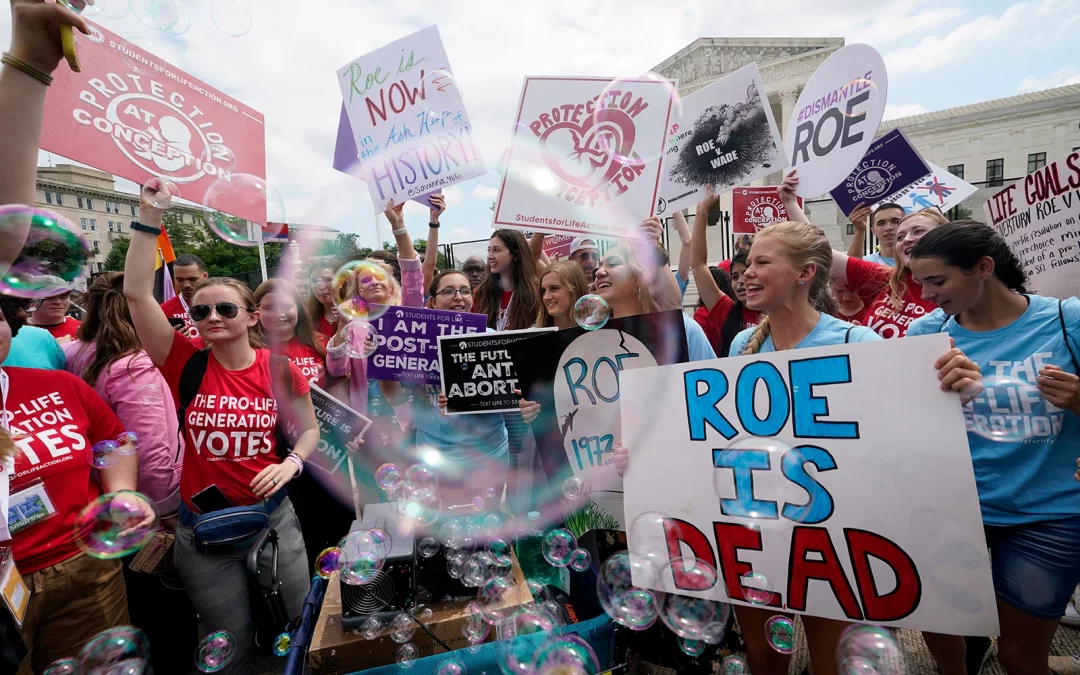
by Bob Smietana, RNS | Jun 27, 2022 | Headline News |
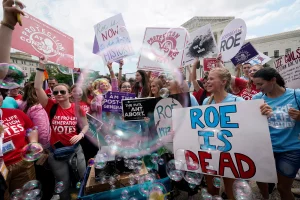
(RNS) — After nearly 50 years, Roe v. Wade, the Supreme Court ruling that legalized abortion nationwide, is no more.
In a 6-3 decision Friday (June 24), the Supreme Court overruled both Roe, decided in 1973, and a 1992 decision in Planned Parenthood v. Casey, which reaffirmed the constitutional right to abortion. The ruling came in the case of Dobbs v. Jackson Women’s Health Organization, which challenged a Mississippi law that imposed strict restrictions on abortion.
“Abortion presents a profound moral question,” the Supreme Court ruled. “The Constitution does not prohibit the citizens of each State from regulating or prohibiting abortion. Roe and Casey arrogated that authority. We now overrule those decisions and return that authority to the people and their elected representatives.”
The Dobbs decision has been anticipated since May, when an early draft of the ruling was leaked to Politico. Friday’s decision to overturn the constitutional right to abortion was met with both rejoicing and dismay by faith leaders, who have been loud voices on either side of the abortion debate since before Roe.
Archbishop William Lori of Baltimore, head of the US Conference of Catholic Bishop’s USCCB’s Committee on Pro-Life Activities, said that Catholics and other faith communities had worked and prayed for Roe’s reversal for years.
He said that the church needs to focus its efforts on a “beautiful vision of human life” and redouble its efforts to assist pregnant mothers who are facing difficult circumstances.
“We haven’t simply opposed abortion,” he said in an interview. “We have been working for the cause of life by providing services — medical services, pro-life pregnancy centers, educational services, charitable services, adoption services.”
Lori added: “What the church has brought to this is a beautiful vision of human life.,” he said. “A beautiful understanding that every life is precious from conception to natural death. We feel that today’s decision by the Supreme Court will help us in communicating and living that vision more effectively. “
The USCCB also called for more support for pregnant women and their children in the wake of Roe v. Wade.
“It is a time for healing wounds and repairing social divisions; it is a time for reasoned reflection and civil dialogue, and for coming together to build a society and economy that supports marriages and families, and where every woman has the support and resources she needs to bring her child into this world in love.”
The Vatican Academy for Life also issued a statement calling for the U.S. to build a society that supports families and “ensuring adequate sexual education, guaranteeing health care accessible to all and preparing legislative measures to protect the family and motherhood, overcoming existing inequalities.”
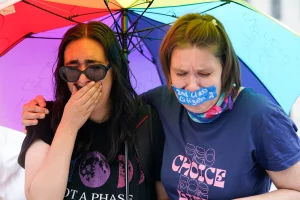 Jamie Manson, president of Catholics for Choice, reacted to the decision with “gut-wrenching horror.”
Jamie Manson, president of Catholics for Choice, reacted to the decision with “gut-wrenching horror.”
“This ruling gives right-wing leaders unfettered license to codify fringe religious beliefs into civil law. It is a full-frontal assault on, and is utterly incompatible with, the bedrock American principles of religious freedom and the separation of church and state.”
Like many Americans, faith leaders remain divided on the issue of abortion.
While more than half of Americans (61%) say abortion should be legal in most or all cases, 74% of white evangelicals say abortion should be illegal in most or all cases. Few Americans believe it should be outlawed completely, according to Pew Research.
“Today is a day of heartbreak, outrage and injustice,” said Jeanné Lewis, CEO of Faith in Public Life, in a statement. “We all have God-given dignity, and we are created to live in respectful relationship with one another. Access to abortion care honors these values; criminalizing people who access or provide abortion does not.”
The National Association of Evangelicals, which filed a brief in the Dobbs case, welcomed the news that Roe was overturned.
“God is the author of life, and every human life from conception to death has inestimable worth,” said Walter Kim, NAE president. “Under Roe v. Wade, our ability to consider policies that safeguard life at the most vulnerable stage was severely limited. While the Dobbs decision doesn’t resolve all the questions on abortion policy, it does remove an impediment to considering pro-life concerns.”
Texas pastor Bart Barber, newly elected president of the Southern Baptist Convention, said that Southern Baptists rejoiced at today’s ruling, and they support laws that would ban abortion, “except in cases wherein the life of the mother is endangered by carrying the baby to term.”
Barber also said “expectant mothers facing difficult circumstances deserve the love and support of the church, the community, and society.”
The New York-based Jewish Council for Public Affairs condemned the Dobbs ruling, saying it does not represent “the will of the people, nor is it in the best interests of the country.” The group also said banning abortion is contrary to Jewish law and values.
“While we treat a fetus with great significance, it does not merit the status of a person until the moment of birth and then it has equal status with the person giving birth,” the JCPA said in a statement. “If the fetus endangers a person’s life physically or, according to at least some Jewish religious authorities, through mental anguish, Jewish law supports abortion of a fetus up until the moment of birth.”
The New York State Catholic Conference said in a response to the decision to overturn Roe, “We give thanks to God.”
“With the entire pro-life community, we are overjoyed with this outcome of the Court,” the statement continued. “However, we acknowledge the wide range of emotions associated with this decision. We call on all Catholics and everyone who supports the right to life for unborn children to be charitable, even as we celebrate an important historical moment and an answer to a prayer.”
The American Humanist Association said the decision will undermine the rights of religious minorities, including non-theists. The group also worries today’s decision will be used in the future to undermine other Supreme Court decisions.
“The reasoning used will further provide a pathway to overturn decisions in important civil rights cases like Obergefell v. Hodges (which prohibits laws banning same-sex marriage) and Loving v. Virginia (which prohibits laws banning interracial marriage) among others, the group said in a statement.
On social media, Amani al-Khatahtbeh, founder of Muslimgirl.com, called the decision a violation of her religious freedom:
The Thomas More Society, a nonprofit legal group that opposes abortion, filed several briefs in the Dobbs case and supports today’s decision.
“Today’s pro-life victory is still only one more step in our ongoing crusade for the sacred cause we serve,” said Tom Brejcha, the group’s president and chief counsel.
Rev. Dr. Susan Frederick-Gray, president of the Unitarian Universalist Association, also sees the Dobbs decision as undermining religious freedom and a violation of her community’s “moral commitment” to the well-being of families.
“This anti-choice decision by the Supreme Court infringes on our deeply held religious beliefs,” she said in a statement. “Access to abortion and the right to choose is an issue of gender equality, bodily autonomy, and religious liberty, all of which are long-held Unitarian Universalist religious teachings.”
This is a breaking story and will be updated.
Jack Jenkins and Claire Giangravè contributed to this report.
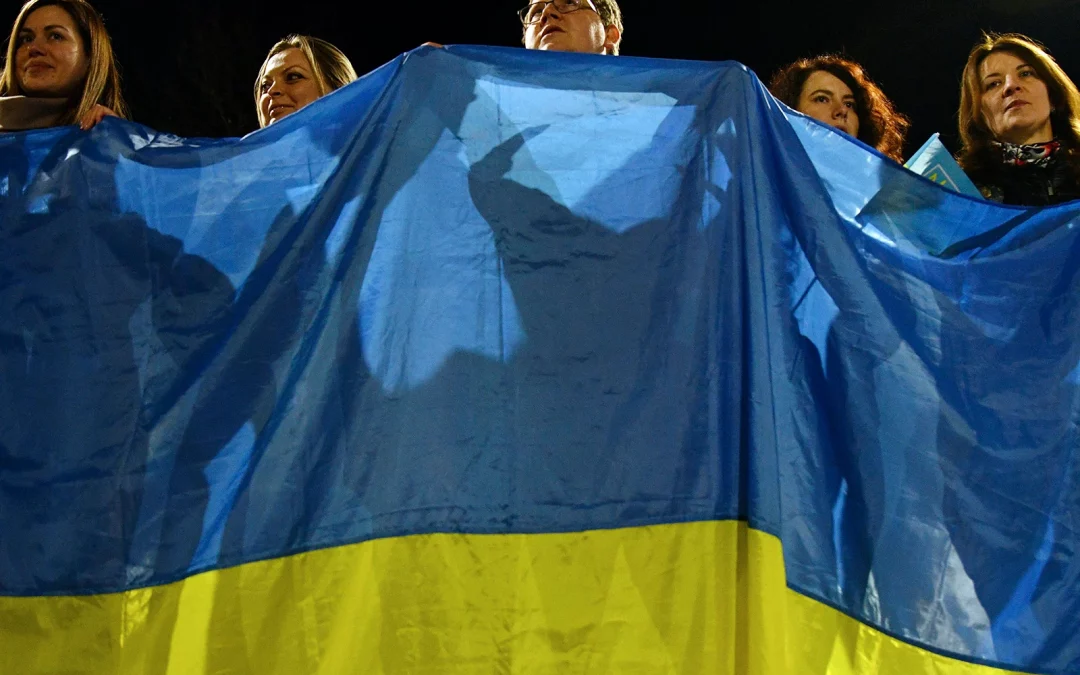
by Bob Smietana, RNS | Mar 3, 2022 | Commentary, Headline News |
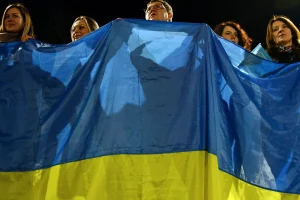
(RNS) — At the top of the website for the Ukrainian Orthodox Church of the USA is a simple, three-word message.
“Pray for Ukraine!”
“May God hear our loving petitions and soften the hearts and minds of all, those within and outside Ukraine, during these dangerous times,” wrote the UOC’s Council of Bishops, in a statement responding to news of the Russian invasion this week.
The bishops of the UOC, founded by immigrants, were among a host of religious leaders asking God to intervene on behalf of Ukraine. The prayers asked for an end of hostilities and for the protection of civilians — and in at least one case, for a defeat of Russian forces.
“Send your heavenly legions, O Lord, commanded by the patron of Kyiv, Archangel Michael, to crush the desires of the aggressor whose desire is to eradicate our people,” the UOC bishops wrote in an online prayer.
Calls for peace also echoed from the Russian Orthodox Cathedral in Washington, D.C., which planned to hold a prayer for peace Thursday (Feb. 24), according to an announcement on the cathedral’s website. The announcement linked to a “prayer for the cessation of civil strife.”
“Lord Jesus Christ our God, look down with Thy merciful eye upon the sorrow and greatly painful cry of Thy children, abiding in the Ukrainian land,” that prayer read. “Deliver Thy people from civil strife, make to cease the spilling of blood, and turn back the misfortunes set against them.”
Patriarch Kirill of Moscow stressed the common religious history of Russia and Ukraine “dating back to the baptism of Russia by the holy prince Vladimir, equal to the apostles,” and said that the Orthodox church could help heal the current conflict, reported the Orthodox Times.
“As Patriarch of All Russia and Primate of the Church, whose flock is in Russia, Ukraine and other countries, I deeply empathize with all who have been touched by misfortune,” Kirill said in a statement. “I call on all parties to the conflict to do everything possible to avoid civilian casualties. I appeal to bishops, pastors, monks and laity with an appeal to provide all possible assistance to all victims, including refugees, people left without shelter and means of subsistence.”
The U.S. Conference of Catholic Bishops asked Catholics to fast for peace on Ash Wednesday (March 2). Bishop David J. Malloy of Rockford, Illinois, chairman of the USCCB Committee on International Justice and Peace, also called for a day of prayer.
“In this time of fear and uncertainty, we stand in solidarity with the Church in Ukraine and offer our support,” Malloy said in a statement. “We call on all the faithful and people of good will to pray for the people of Ukraine.”
https://twitter.com/USCCB/status/1496888441409257479?s=20&t=MqRp5Sh4Zf5eQYVgitAmeQ
Faith-based and humanitarian groups expressed concerns about a possible mass exodus of refugees. Along with praying for those affected by the invasion, Krish O’Mara Vignarajah, president of Lutheran Immigration and Refugee Service, called on political leaders to prepare to protect displaced people.
“The humanitarian implications of a full Russian invasion must be a central consideration in the U.S. and international response,” Vignarajah said. “Thousands could lose their lives, and millions more could lose the only home they have ever known. The U.S. and its allies must prepare to respond to the very real possibility of a mass exodus of Ukrainian refugees. Protecting the displaced cannot merely be an afterthought.”
Pax Christi, a Catholic peace organization, encouraged its members to pray and fast and to hold public vigils for peace on Ash Wednesday.
“Pax Christi USA urges the international community to stand united against the invasion of Ukraine and in support of diplomacy and dialogue to bring this crisis to an end,” the group said in a statement.
In the United Kingdom, the archbishops of Canterbury and York issued a joint pastoral letter in response to the invasion, with calls for prayer along with liturgical texts and readings in support of peace. Archbishop Justin Welby and Archbishop Stephen Cottrell invited Anglican church members to make Sunday a day of peace and to join the call of Pope Francis for prayers on Ash Wednesday.
“Peace, therefore, is so much more than the absence of war,” they wrote. “It is a gift, and it is also a decision, a gift that must be received. It is a choice we make that shapes the way we live well alongside each other. It characterises our relationship with God. It comes into being by seeking justice.”
Leaders of the United Church of Christ began their prayer, posted online, with a quote from the Book of Proverbs: “There are six things that the Lord hates, seven that are an abomination to him: haughty eyes, a lying tongue, and hands that shed innocent blood, a heart that devises wicked plans, feet that make haste to run to evil, a false witness who breathes out lies, and one who sows discord among brothers.”
“Hear our prayers for all those who will die today because of war in Ukraine and other war-torn countries all over this world. Grant them an end to the suffering of this world and eternal peace that is only found in You,” the UCC officers wrote.
A number of faith leaders took part in an online vigil for peace this week — including Presiding Bishop Michael Curry of the Episcopal Church; Presiding Bishop Elizabeth Eaton of the Evangelical Lutheran Church in America; Rabbi Jonah Dov Pesner, director of the Religious Action Center of Reform Judaism; and Mohamed Elsanousi, executive director of The Network for Religious and Traditional Peacemakers, as Religion News Service reported earlier this week.
“The drums of war are beating louder with each passing moment,” said Tarunjit Singh Butalia of Religions for Peace USA during the vigil. “We must stand up as people of faith and people of peace to speak truth to power.”
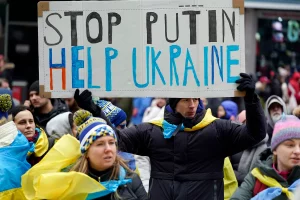
Hazrat Mirza Masroor Ahmad, head of worldwide Ahmadiyya Muslim community, prayed that world leaders would try to de-escalate the situation in Ukraine before it can spread into a wider conflict.
“I pray that the world’s leaders pay heed to the need of the hour and value, above all else, their obligation to ensure the peace and stability of the world. May Allah the Almighty protect all innocent and defenceless people and may true and lasting peace in the world prevail,” he said in a statement.
Prayers for Ukraine were offered during a recent meeting of the Southern Baptist Convention’s Executive Committee in Nashville, Tennessee, and Southern Baptist leaders and other influential evangelicals offered prayers via social media.
“Christ have mercy. Pray for Ukraine,” tweeted Adam Greenway, president of Southwestern Baptist Theological Seminary.
https://twitter.com/AdamGreenway/status/1496683559234514953?s=20&t=S6equWVmQH7dPALVIEpwbg
https://twitter.com/DavidAFrench/status/1496732331373170688?s=20&t=S6equWVmQH7dPALVIEpwbg
“Do not imagine for a moment prayer doesn’t matter,” tweeted Bible teacher Beth Moore. “Pray for Ukraine. Pray for divine intervention. Miraculous protection.”
https://twitter.com/BethMooreLPM/status/1496837327657656325?s=20&t=S6equWVmQH7dPALVIEpwbg
The World Evangelical Alliance and the European Evangelical Alliance called for an end of hostilities in Ukraine and withdrawal of all Russian troops.
“We are gravely concerned to yet again witness armed conflict that will inevitably lead to tragic loss of human lives, including innocent civilians who only desire to live in peace,” the WEA’s secretary general, Bishop Thomas Schirrmacher, said in a statement. “We call for an end to the hostilities, an immediate ceasefire and respect for Ukrainian territorial integrity.”
The American Friends Service Committee, a Quaker peace organization, urged U.S. leaders and the international community to pursue diplomacy and deescalation rather than a military response to the crisis in Ukraine.
The group also passed along a message from Quakers in Ukraine calling for peace. “It is very important for us to convey that Ukrainians are peace-loving people and very kind. In the last two months, when we got together and started our meetings, we agreed that there is no one among us who would see war as the answer, or believe that violence is the way out,” the message read. “We categorically condemn any aggression, expansion, and pressure.”
Claire Giangravé, Adelle Banks, Jack Jenkins and Emily McFarlan Miller contributed.
READ THIS STORY AT RELIGIONNEWS.COM
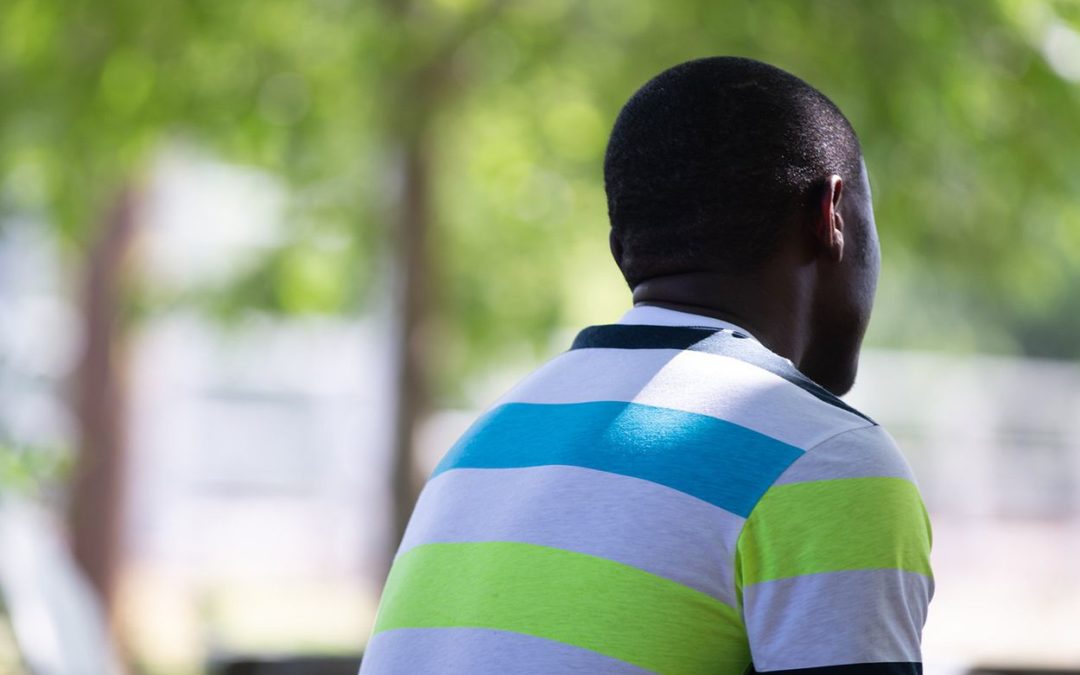
by Bob Smietana, RNS | Jan 11, 2022 | Commentary, Headline News |
MILWAUKEE (RNS) — Asher Imtiaz is the kind of person who always seems to be wandering into a great story.
Like the time in 2017, when the Pakistani American computer scientist and documentary photographer walked into a Target in Nebraska and ended up being invited to a wedding thrown by Yazidi refugees from the Middle East.
Imtiaz had gone to Nebraska to shoot pictures of life in small-town America in the age of Trump, far from the country’s urban centers. Among his portfolio from the time is another Yazidi family, dressed in patriotic garb and heading to a Fourth of July picnic.
“I went to see America and found these new Americans,” said Imtiaz at a coffee shop on the north side of Milwaukee last year.
Imtiaz fits right in at Eastbrook Church, a multi-ethnic congregation where he serves as a volunteer leader at an outreach ministry for international students at the University of Wisconsin-Milwaukee campus nearby.
Eastbrook is a bit of an outlier these days, a place where refugees, immigrants and international students are welcome at a time when American evangelicals are increasingly suspicious of newcomers to the United States.
According to data from the Public Religion Research Institute’s Immigration Policies Survey, nearly 6-in-10 (59%) white Evangelical Protestants agreed with the statement “Immigrants are invading our country and replacing our cultural and ethnic background.” By contrast, only 31% of Americans overall agreed with that statement.
At an outdoor service at Eastbrook in August, Imtiaz wandered through the congregation greeting friends and exchanging hugs as a diverse worship team led the congregation through a mix of traditional and contemporary songs. The service started with the singing of the traditional Doxology, which begins, “Praise God from whom all blessings flow,” followed by songs like “You Are Good” and “Way Maker,” by Nigerian gospel singer Sinach.
That was followed by a reading of Psalm 23 in English, Spanish and Yoruba.
The church was founded in 1979 by members of Elmbrook Church, a megachurch about 20 miles to the west. Elmbrook’s then pastor was hoping to get church members more involved in the communities where they lived. Dubbed Eastbrook, it was led for three decades by former missionaries Marc and Nancy Erickson. For the past 11 years the pastor has been Matt Erickson (no relation).
The proximity of the university campus led to an intentional outreach to college students, especially those from overseas, which continues four decades later.
Every fall, church members give tours of Milwaukee to newly arrived international students, who are then invited to have dinner at the homes of church members. Many of those students come from Christian backgrounds and are seeking to connect with a church, said Imtiaz, who was raised as an Anglican in Pakistan, a country where only about 2% of the population is Christian.
Those students are also looking for friendship. Imtiaz pointed to a 2012 study of international students in the South and Northeast, which found that 40% of those students had no close friendships with Americans. Through the outreach at Eastbrook, their students often make friends in their first days in the country. Many of them end up spending holidays with church members and making longtime friendships.
“It’s basically providing a home away from home,” he said.
The church also operates an International Community Center on the south side of the city, where a number of recent refugees and other immigrants have settled. The center teaches English as a Second Language classes and provides support with issues like housing and education. About 30 people will end up dropping by the center most days, Dan Ryan, senior director of mission at the church, said in an interview in early January 2022.
Ryan said the church is helping resettle some recent refugees from Afghanistan. He understands that some of his fellow evangelicals around the country are resistant to the idea of resettling refugees. Since refugees are here in the States, he said, churches need to reach out in love.
“Yes, have your political ideas,” he said. “But don’t lose sight of the people involved.”
Ryan said that the church and the center are very open about the Christian motivations for their outreach efforts. But they also steer clear of proselytizing. Their main goal, Ryan said, is to show love and welcome to their new neighbors, a point echoed by Matt Erickson.
“It’s a ministry of care and concern and tangible ways of loving people welcoming people,” he said.
“These folks are treasured by God and valuable in his sight,” said Erickson, who spent several years on the staff of World Relief, a Christian organization that helps resettle refugees in the United States.
While he’s not shy about talking about faith, Imtiaz doesn’t see himself as a “Christian photographer.” He said that Christians in the United States sometimes see their neighbors as “projects” or prospective converts, rather than seeing them as people first. He takes a slower approach, trying to befriend people and see them as a neighbor who is valuable in God’s sight.
As a photographer, Imtiaz practices something he calls “God at ‘I’ level” — trying to connect with the people he photographs as human beings, long before taking their picture.
Like many churches in the United States, Eastbrook has felt the pressure of the country’s political polarization inside the church. Erickson said that Eastbrook has always tried to bring together people from different backgrounds, as task made more difficult by the broader conflicts in American public life over race, politics and increasingly, COVID-19.
He often turns to a verse from the New Testament Book of Galatians, in which the apostle Paul urges his readers to “bear one another’s burdens.”
“The last couple of years have given us lots of opportunities to live that out,” he said. “Sometimes we are doing it well and sometimes we are not. Part of being a body is that we have to learn to talk with each other, and we have to learn how to understand each other.”
During his sermon at the outdoor service in August, Erickson urged church members to ground their lives in the Bible and its message of love, rather than on the noise of the outside world. Without that solid foundation, he said, their lives won’t reflect the kind of love God wants them to share.
“Brothers and sisters, I just want to ask us today, are we giving more time to the news, are we giving more time to social media than we are to the Word of God and letting it sink into our lives?” he said. “I’m not trying to be legalistic. I’m just sick of us being brainwashed and want us to stand in the kingdom.”.
Among the people at Eastbrook that Sunday were Mahitha Voola and Manna Konduri, both originally from India, who came to Eastbrook through the church’s outreach to international students and ended up staying after graduation.
From the beginning, people at the church made them feel at home.
“They say, ‘Oh, taste and see the Lord is good,’” Voola said, quoting a verse from the Psalms. “I’ve tasted that love of God through these people and through the church. I feel very blessed to be part of it.”
The two said they hope to pass on the welcome they have received.
“Today we are the recipients of this love,” Konduri said. “Tomorrow, maybe we will be the ones to show that to someone else.”
Eastbrook’s ethic of welcome, Imtiaz said, has been as much a boon for him as it is for the newcomers.
He’s particularly interested in documenting the story of immigrants and refugees, whom he likes to refer to as “new Americans.” For several years he lived in an apartment complex where newly resettled refugees were living so that he could get to know them. He ended up photographing a number of neighbors after building friendships. When he got COVID-19 — a mild case — one of his former neighbors, a woman from Iraq, would send him soup.
Imtiaz hopes that his photographs and work at the church will inspire people to get to know their neighbors, no matter where they come from.
“If I can go to Nebraska and go to Target and meet 400 Yazidis, anybody else can,” he said.


 Jamie Manson, president of Catholics for Choice, reacted to the decision with “gut-wrenching horror.”
Jamie Manson, president of Catholics for Choice, reacted to the decision with “gut-wrenching horror.”



